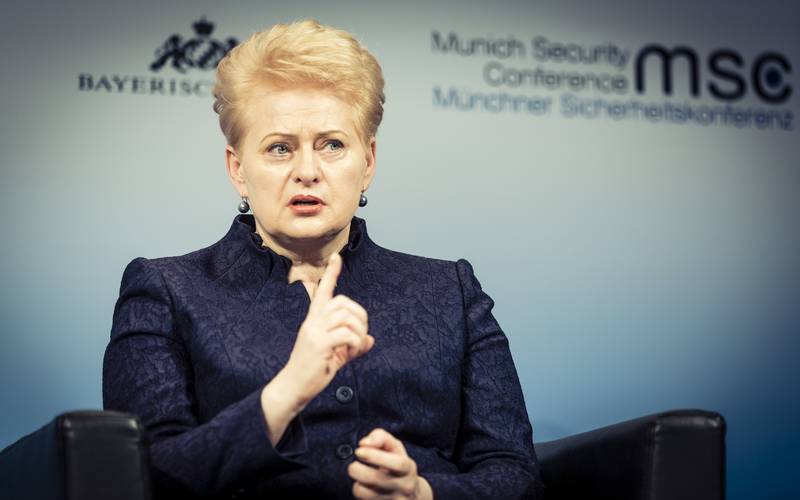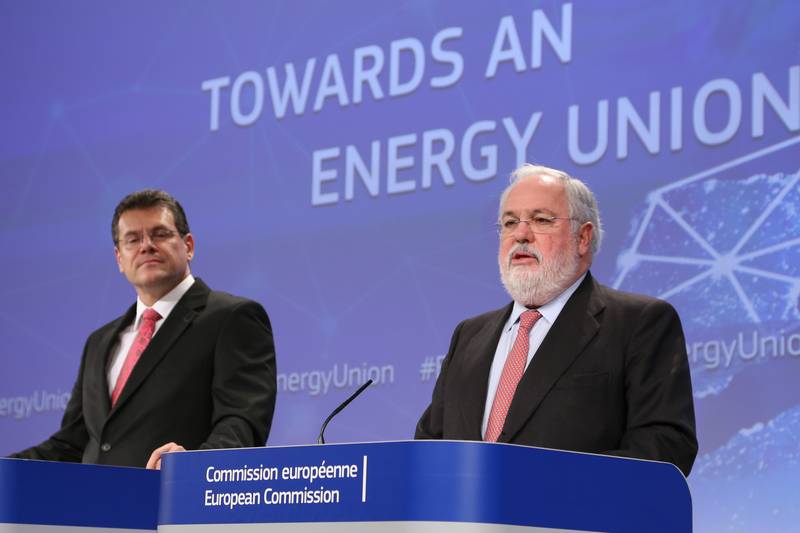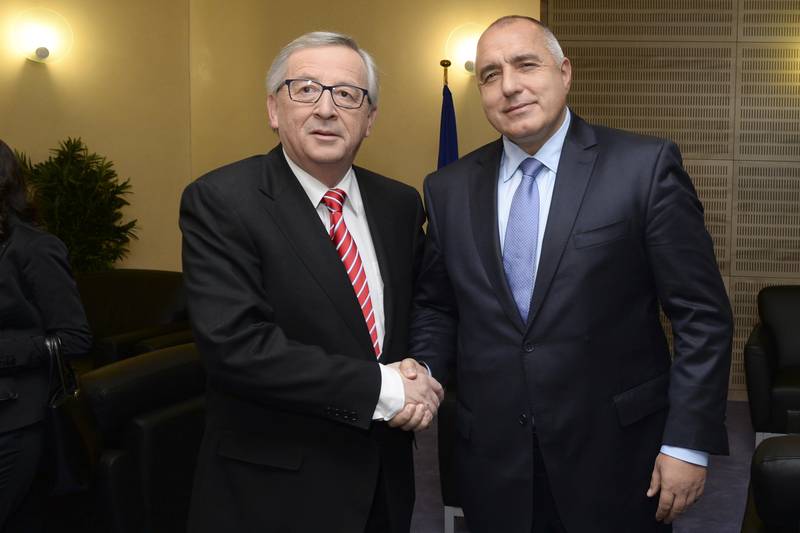Rebecca Harms: stronger budgetary control in the EU, but only under stronger rules on the financial markets
Ralitsa Kovacheva, May 30, 2010
 I am meeting Rebecca Harms in front of the Ministry of Economy, Energy and Tourism, where her meeting with Minister Traycho Traykov has just ended. Harms is a Co-Chair of the Group of the Greens/European Free Alliance in the European Parliament and also a rapporteur on the 'Kozloduy Programme'- financial assistance with respect to the decommissioning of Units 1 to 4 of the “Kozloduy” nuclear power plant. The Member of the European Parliament is explaining that the purpose of her meeting with the Minister was her position about additional for Kozloduy compensations to be well understood, especially here in Bulgaria.
I am meeting Rebecca Harms in front of the Ministry of Economy, Energy and Tourism, where her meeting with Minister Traycho Traykov has just ended. Harms is a Co-Chair of the Group of the Greens/European Free Alliance in the European Parliament and also a rapporteur on the 'Kozloduy Programme'- financial assistance with respect to the decommissioning of Units 1 to 4 of the “Kozloduy” nuclear power plant. The Member of the European Parliament is explaining that the purpose of her meeting with the Minister was her position about additional for Kozloduy compensations to be well understood, especially here in Bulgaria.
Because during the discussions in the European Parliament the Greens demanded the allocation of funds to be bound with a commitment for the construction of a repository for spent nuclear fuel. The proposal, however, was not supported in the final vote of the programme. Ms Harms says that with this funding an equal treatment of Bulgaria, Slovenia and Lithuania has been achieved, and she supports this decision. But she believes, that Bulgaria is still facing the problem with finding a lasting solution.
She was apparently pleased with her meeting with Minister Traykov, at least because there was a dialogue, unlike before, after her own words. Traycho Traykov had assured her that the Bulgarian Ministry of Economy and Energy was seeking an alternative to the export of spent nuclear fuel in Russia. Until recently, the spent nuclear fuel was being returned to Russia but under the arrangements between the two countries, after a period of reprocessing the waste must be returned back to Bulgaria. The last amount spent fuel, however, was not exported to Russia and has been stored in Bulgaria, Minister Traykov had told to her. And he had also assured her that the Ministry was working on an option for a temporary dry storage facility for nuclear waste, similar to those in the U.S. and in some of the old EU member states.
As with regard to the spending of part of the “Kozloduy” funding for the construction of a repository for permanent storage of nuclear waste, it “is not in the immediate priorities of the government", Traykov had said in response to a question from the MEP. According to the official press release of the Ministry, Traykov had explained that "this is a costly process on which countries like France, Germany, USA, Sweden, Finland are working. Our country is following closely the results of this development in order to apply their best experience, because his issue will be relevant for Bulgaria in a few decades. The current priority of the government is to develop the grid and energy efficiency."
Bulgaria's position is that resolving the issue of storing nuclear fuel is not bound in any way to the construction of our second nuclear plant “Belene”. Traycho Traykov had explained that finding a European strategic investor for “Belene” was a key task in order the construction of the second nuclear power plant to continue, and Bulgaria saw its national interest in“Belene” as a European project.
Rebecca Harms, in her turn, had reiterated her opinion that if, however, this project was to be realised, it should be elsewhere, because she had strong concerns about the seismic problems in Belene. "If Bulgaria has a choice now for new investments in the power sector, the nuclear power is too expensive, there are better available technologies, than a new nuclear power plant”, Ms Harms is convinced. To my question whether Minister Traykov had agreed with her, she was quick to answer shortly with "No" while smiling. "But what gives me hope is that he is quite reasonable and economically thinking man. And I would say it again and again that also the economic reasons are really against the construction of a new nuclear power plant."
We are abruptly changing the subject because of the current hot debates in the European Union and in particular - in the European Parliament on economic issues. According to Ms Harms, there are two main fields of work in the EU. First is deeper integration of all the countries both in the euro area and across the EU. "We saw that the idea to have a common currency, but not a common financial and economic strategy, cannot really work. It is very difficult to figure out a deeper integration, because some of the member states do not want deeper integration”, Rebecca Harms is explaining.
What makes the issue so delicate is that it means bigger impact on national budgets and most the countries do not like their budgets to be observed, she thinks. But meanwhile the situation in the southern European countries and also in Ireland and the United Kingdom shows that budgetary discipline is not functioning, the countries are spending much more than the capacity of their national budgets.
According to the MEP, however, the other side of the problem is the lack of a functioning regulation of the financial markets. "It is a really shocking and alarming problem that countries like Greece, Portugal and Italy, who have budgetary problems, can in addition become victims of speculations by large banks and other financial institutions like hedge funds, because there are no limits to the speculations on the financial markets."
The Majority in the European Parliament is convinced that there is a need for greater integration and better coordination of financial and economic fields. There are, however, differences in the positions of various parties in terms of financial regulation. The Socialists and Democrats, the Greens and also the left-wing parties in general are in favour of stricter regulation of financial markets, Harms is explaining:
"We gave billions of public money to save banks and now we have to decide how to get this money back from those who made profits of these very risky financial transactions. That’s why we are in favour of a financial transactions tax, the so called Tobin tax. The Group of the European People's Party is not really convinced on that, and the Group of the Liberals and Democrats has not decided yet”.
According to her, the success of the measures for stricter budgetary discipline depends on the implementation of more stringent regulation of financial markets: "I cannot ask for more budget discipline, given we spent so much money for banks, but in the same time, we still have not decided how to get the money back from the banks. Banks have really a good life, we are saving them again and again and the citizens have to pay the bill."
We are drinking coffee with Rebecca Harms in a small park in Sofia city centre, after she  refused with determination to go to a smoky hotel lobby. I'm asking her to comment on the decision of the Bulgarian Parliament not to ban smoking in public places, but to prohibit children to go to places where smoking is allowed. "This is not a very family friendly decision, rather it is family unfriendly", Ms. Harms is commenting with a smile. "In Germany we had a lot of discussions about banning smoking in restaurants. But even my husband, who was a strong smoker, believes that it is better to eat without smoke in the room."
refused with determination to go to a smoky hotel lobby. I'm asking her to comment on the decision of the Bulgarian Parliament not to ban smoking in public places, but to prohibit children to go to places where smoking is allowed. "This is not a very family friendly decision, rather it is family unfriendly", Ms. Harms is commenting with a smile. "In Germany we had a lot of discussions about banning smoking in restaurants. But even my husband, who was a strong smoker, believes that it is better to eat without smoke in the room."
There are different practices in Europe, but this is mostly about the quality of life, the MEP said. Therefore, in Bulgaria it will happen step by step. However, they managed to introduce stricter smoking bans in Italy, Rebecca Harms is laughing. According to her, the younger generation smokes less, so there's development in the right direction.
We are separating, because Rebecca Harms has a tough schedule put at risk because of Sofia's traffic. While I am threading between the cars, parked on the sidewalk, I am still deliberating on her words about the quality of life. Because any decision - about smoking, the budget or nuclear energy is actually a decision about the quality of our lives. And it is up to us to require more.
 Dalia Grybauskaite | © MSC/Koerner
Dalia Grybauskaite | © MSC/Koerner Maros Sefcovic, Miguel Arias Canete | © European Commission
Maros Sefcovic, Miguel Arias Canete | © European Commission Jean-Claude Juncker, Boyko Borissov | © European Commission
Jean-Claude Juncker, Boyko Borissov | © European Commission